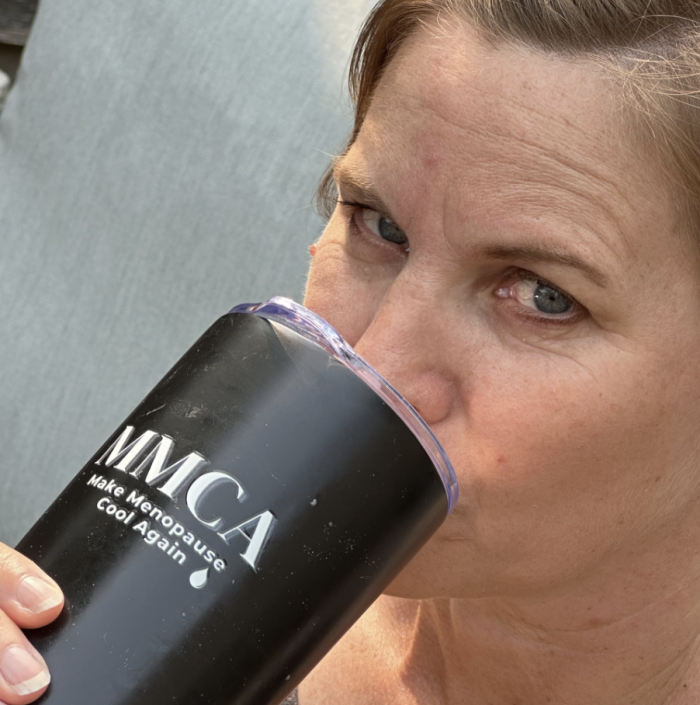My chiropractor called it a perfect storm.
When the weather finally warms in Minnesota and a long weekend beckons, I want to do allll the things—run, golf, clean my bookshelves, hang out with neighbors at an outdoor celebration—all while indulging in quick, easy food truck staples and adult beverages.
But there is such a thing as too much fun.
My back went out on the golf course. Thank goodness we had a cart.
Back pain stops you in your tracks. When even feeding the pets causes excruciating pain, you know you’re not RSVPing to anything soon.
Everyone understands back pain, at least conceptually. I can freely admit it to anyone. The neighbors send sympathy via text. It’s not embarrassing; it’s part of life.
But when I add that in addition to back pain, I’m experiencing nearly hourly night sweats and hot flashes, well, the energy shifts.
People are less comfortable. They don’t send sympathetic texts.
But hot flashes are also part of life. They mark, for many women, the transformation of menopause—what should be a profound and meaningful time of life.
In 1839, a French doctor named Charles-François Menville said the following about menopause:
“When the vital forces seek to work together in the interest of the uterus, they go to join those of the mind and the rest of the body. The critical age passed, women have the hope of a longer life than men, their thought acquires more precision, scope, and vitality.”
Quite a radical view for that time, especially considering that roughly a century later, Feminine Forever by Robert Wilson contained gems such as this:
“Menopause is not a natural process; it’s a disease, a scourge that afflicts women.”
Just for giggles, here are a few of Mr. Wilson’s other “insights:”
>> “Why should men suffer through their wives’ mood swings and hot flashes?”
>> “Women’s bodies are fundamentally flawed, but we can fix them with hormones. Menopause is just a manifestation of female inadequacy.”
>> “Forget about embracing your age gracefully; fight it tooth and nail with hormone therapy. Aging is a woman’s worst enemy.”
But today, menopause is becoming quite a hot topic—pun intended. For example, the groundbreaking 2025 Oprah special entitled “The Menopause Revolution,” or outspoken advocates like Halle Berry saying:
“[Menopause is] an exciting time for a rebirth…It’s not the time to pack it up. It’s the time to ask, ‘Now that I’m free, what can I do?'”
Hot flashes aside, this life transition is something to be honored and even revered, as it offers women a whole new lease on life.
So what is it about menopause that causes such discomfort?
Is it because when someone announces a hot flash (or when their face gives it away), they are also announcing their age?
Does it tangentially make people think about menstruation, and we know we’re not supposed to talk about that in public?
Is it the idea of a woman’s body sweating?
Or is it because women’s bodies are always sexualized, and menopause (according to the culture) marks the end of our sexual prime?
All of the above, maybe.
Negative connotations about menopause are stitched into the fabric of our society. Stigmas have created a world in which talking about menopause—a process that 100 percent of women will go through if they have the opportunity to live long enough—is mysterious, taboo, and not appropriate dinner table conversation.
It doesn’t have to be this way. We don’t have to accept the status quo.
Normalization is possible—and long overdue.
Men have normalized many issues unique to them, and that is good. They have treatments and information at their fingertips for erectile dysfunction, low testosterone, hair loss, and more. Commercials abound while industries rush to provide treatment.
Meanwhile, most commercials aimed at women are about how to stay young at all costs—not how to age into wisdom.
Menopause is not easy, I can attest. But it would be a lot more comfortable if stigmas and silence didn’t weigh it down. It would be much more possible to get the information, resources, and support we need.
Deliberate or not, we have made a cultural choice to downplay, ignore, or dread this incredible stage of life and to push women into silence as they grow older.
And it can be our choice to break those rules. To MMCA (make menopause cool again)!
It starts when we, both men and women, decide that this transition matters. And we infuse this time of life—this journey into elderhood—with meaning.
It might be an uphill climb, but it’s one I’m willing to walk, just as long as I don’t have to swing a golf club.
~


 Share on bsky
Share on bsky





Read 5 comments and reply